专题三 介词和连词
- 格式:doc
- 大小:101.50 KB
- 文档页数:15
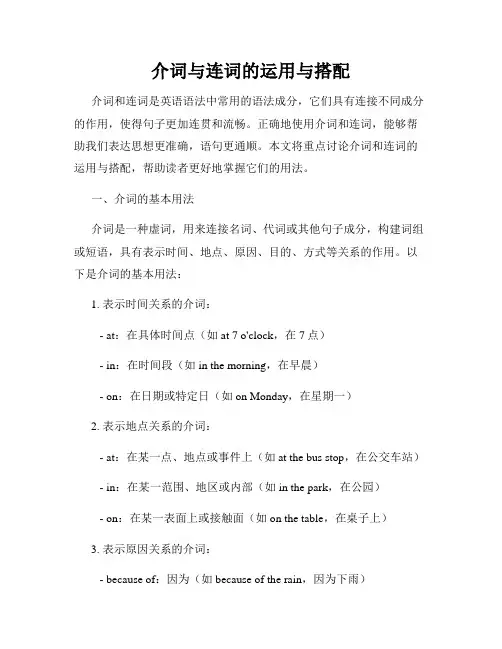
介词与连词的运用与搭配介词和连词是英语语法中常用的语法成分,它们具有连接不同成分的作用,使得句子更加连贯和流畅。
正确地使用介词和连词,能够帮助我们表达思想更准确,语句更通顺。
本文将重点讨论介词和连词的运用与搭配,帮助读者更好地掌握它们的用法。
一、介词的基本用法介词是一种虚词,用来连接名词、代词或其他句子成分,构建词组或短语,具有表示时间、地点、原因、目的、方式等关系的作用。
以下是介词的基本用法:1. 表示时间关系的介词:- at:在具体时间点(如at 7 o'clock,在7点)- in:在时间段(如in the morning,在早晨)- on:在日期或特定日(如on Monday,在星期一)2. 表示地点关系的介词:- at:在某一点、地点或事件上(如at the bus stop,在公交车站) - in:在某一范围、地区或内部(如in the park,在公园)- on:在某一表面上或接触面(如on the table,在桌子上)3. 表示原因关系的介词:- because of:因为(如because of the rain,因为下雨)- due to:由于(如due to his absence,由于他的缺席)4. 表示目的关系的介词:- for:为了(如study hard for the exam,为了考试努力学习)- to:向、给予某人(如give the book to me,把书给我)- with:用、以(如write with a pen,用钢笔写)5. 表示方式关系的介词:- by:通过、用(如travel by train,乘火车旅行)- in:以…方式(如in English,在英语中)二、连词的基本用法连词是一种虚词,用来连接两个词、短语、句子或句子成分,构建复合句,表示并列、因果、条件、让步、递进等关系。
以下是连词的基本用法:1. 表示并列关系的连词:- and:和、与(如apples and oranges,苹果和橙子)- or:或者(如tea or coffee,茶或咖啡)- but:但是(如I like him but he doesn't like me,我喜欢他但他不喜欢我)2. 表示因果关系的连词:- because:因为(如I stayed home because it was raining,因为下雨我呆在家里)- since:因为(如He has been living here since he was born,他从出生起就住在这里)3. 表示条件关系的连词:- if:如果(如I will go if you come,如果你来我就去)- unless:除非(如I won't go unless you invite me,除非你邀请我我才会去)4. 表示让步关系的连词:- although:尽管(如Although it was raining, we went out,尽管下雨,我们还是出去了)- though:虽然(如Though he is young, he is very talented,虽然他很年轻,但很有才华)5. 表示递进关系的连词:- and:而且、又(如I bought a book and a pen,我买了一本书和一支笔)- furthermore:而且、此外(如Furthermore, the weather is getting better,此外,天气越来越好)三、介词与连词的搭配运用正确地搭配介词和连词,能够使句子更加准确、流畅。
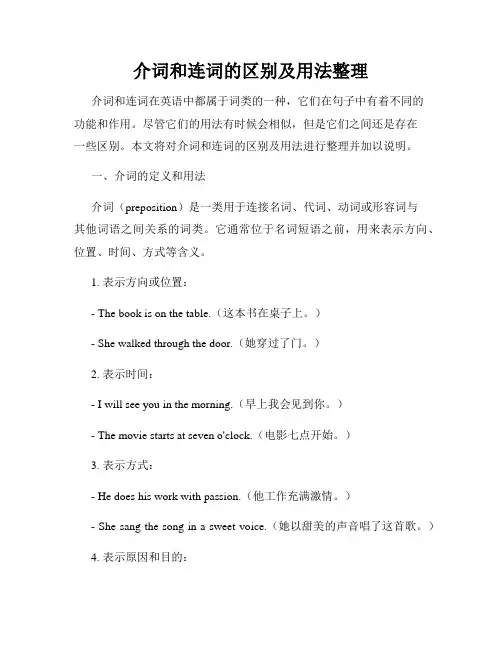
介词和连词的区别及用法整理介词和连词在英语中都属于词类的一种,它们在句子中有着不同的功能和作用。
尽管它们的用法有时候会相似,但是它们之间还是存在一些区别。
本文将对介词和连词的区别及用法进行整理并加以说明。
一、介词的定义和用法介词(preposition)是一类用于连接名词、代词、动词或形容词与其他词语之间关系的词类。
它通常位于名词短语之前,用来表示方向、位置、时间、方式等含义。
1. 表示方向或位置:- The book is on the table.(这本书在桌子上。
)- She walked through the door.(她穿过了门。
)2. 表示时间:- I will see you in the morning.(早上我会见到你。
)- The movie starts at seven o'clock.(电影七点开始。
)3. 表示方式:- He does his work with passion.(他工作充满激情。
)- She sang the song in a sweet voice.(她以甜美的声音唱了这首歌。
)4. 表示原因和目的:- They went to the park for a walk.(他们去公园散步。
)- She studies hard for good grades.(为了好成绩,她努力学习。
)二、连词的定义和用法连词(conjunction)是连接词语、短语或句子的词类。
它用来连接句子或句子中的成分,使句子关系更加密切、连贯、完整。
1. 表示并列关系:- I like pizza and she likes spaghetti.(我喜欢比萨,她喜欢意大利面。
)- He is tall but his brother is short.(他很高,但他的兄弟很矮。
)2. 表示选择关系:- Do you want tea or coffee?(你想要茶还是咖啡?)- You can either go with us or stay at home.(你要么跟我们一起去,要么待在家里。
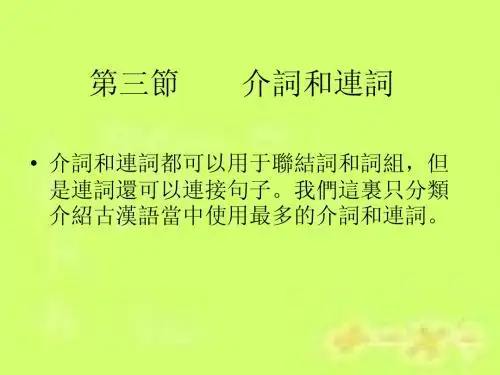
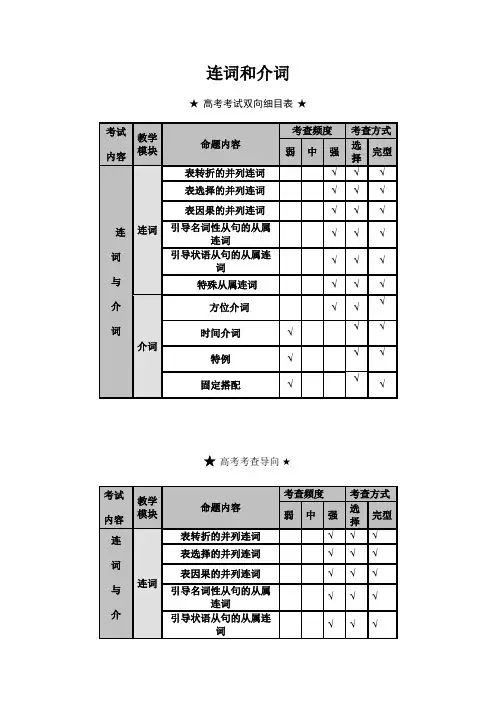
连词和介词★高考考试双向细目表★★高考考查导向★并列连词★教学起点★高考趋式高考试题常设置特定语境考查热点介词和连词与介词的固定搭配及其变形。
连词不能在句子里独立地担当句子成分、而只能起连接作用,连接词与词,短语与短语、句子与句子。
★互动研学★并列连词1.表示转折关系的并列连词有but,yet,still,while,when (然而,偏偏)等。
例1:The car is very old but it runs very fast.这辆小汽车虽然很旧了,但跑得很快。
例2:The winter in Beijing is very cold while that of Kunming is warm.北京的冬天很冷,然而昆明的冬天却很暖和。
例3:Why did you borrow the book when you had one?这本书你有一本,为什么偏偏还借呢?例4:The problem was a little hard, yet I was able to work it out.这道题有点难,然而我却把它做出来了。
例5:I explained twice, still he couldn't understand.我解释了两遍,然而他却还不懂。
注意:while在表示转折关系时,往往连接内容和结构对称的句子。
I love strong tea while my father loves coffee.我喜欢浓茶,然而我爸爸却喜欢咖啡。
2. 表示选择关系的并列连词有or, or else, either…,or…,neither…nor…,otherwise 等。
例1:Would you like to leave or would you like to stay? 你是想走呢还是想留?例2:Do you go to school by bus or on foot? 你上学是坐公共汽车还是走着去?例3:You can come either on Saturday or on Sunday.你可以星期六来也可以星期天来。
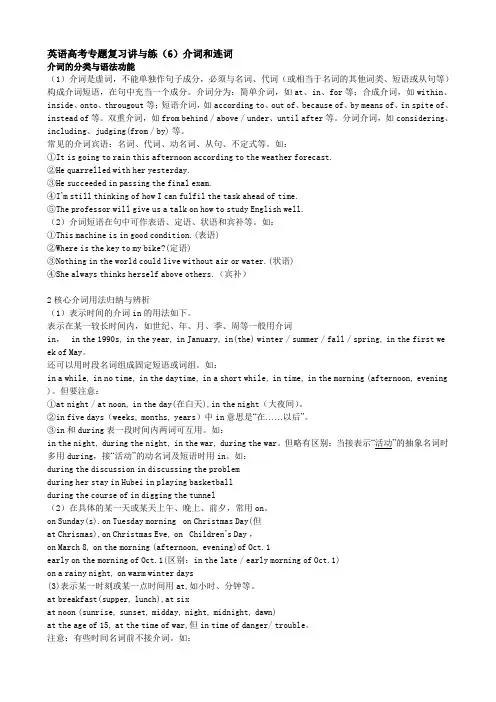
英语高考专题复习讲与练(6)介词和连词介词的分类与语法功能(1)介词是虚词,不能单独作句子成分,必须与名词、代词(或相当于名词的其他词类、短语或从句等)构成介词短语,在句中充当一个成分。
介词分为:简单介词,如at、in、for等;合成介词,如within、inside、onto、througout等;短语介词,如according to、out of、because of、by means of、in spite of、instead of等。
双重介词,如from behind/above/under、until after等。
分词介词,如considering、including、judging(from/by)等。
常见的介词宾语:名词、代词、动名词、从句、不定式等。
如:①It is going to rain this afternoon according to the weather forecast.②He quarrelled with her yesterday.③He succeeded in passing the final exam.④I’m still thinking of how I can fulfil the task ahead of time.⑤The professor will give us a talk on how to study English well.(2)介词短语在句中可作表语、定语、状语和宾补等。
如:①This machine is in good condition.(表语)②Where is the key to my bike?(定语)③Nothing in the world could live without air or water.(状语)④She always thinks herself above others.(宾补)2核心介词用法归纳与辨析(1)表示时间的介词in的用法如下。
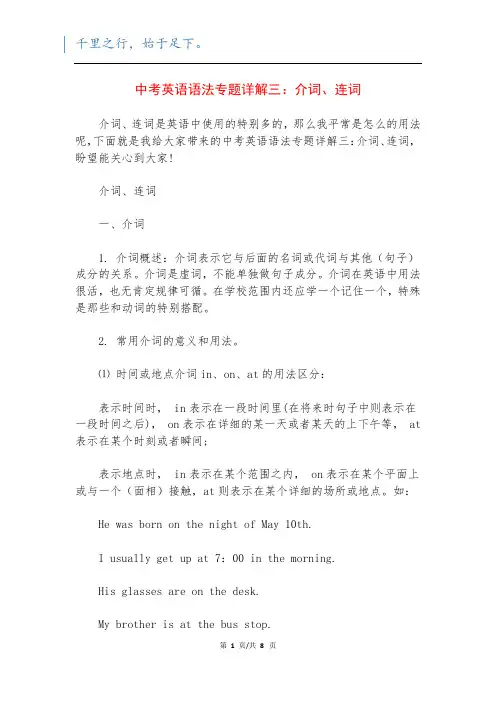
中考英语语法专题详解三:介词、连词介词、连词是英语中使用的特别多的,那么我平常是怎么的用法呢,下面就是我给大家带来的中考英语语法专题详解三:介词、连词,盼望能关心到大家!介词、连词一、介词1. 介词概述:介词表示它与后面的名词或代词与其他(句子)成分的关系。
介词是虚词,不能单独做句子成分。
介词在英语中用法很活,也无肯定规律可循。
在学校范围内还应学一个记住一个,特殊是那些和动词的特别搭配。
2. 常用介词的意义和用法。
⑴ 时间或地点介词in、on、at的用法区分:表示时间时, in表示在一段时间里(在将来时句子中则表示在一段时间之后), on表示在详细的某一天或者某天的上下午等, at 表示在某个时刻或者瞬间;表示地点时, in表示在某个范围之内, on表示在某个平面上或与一个(面相)接触,at则表示在某个详细的场所或地点。
如:He was born on the night of May 10th.I usually get up at 7:00 in the morning.His glasses are on the desk.My brother is at the bus stop.⑵ after与in表示时间的用法区分:“after+(详细时刻/从句)”表示“在时刻之后”常用于一般过去时态;“in+(一段时间)”表示“在(多久)之后”,常用于将来时态。
如:He said that he would come back after 6:00.My father is coming back from Astralia in about a month.⑶ since与for表示时间的用法区分:“since+(详细时刻/that-从句)”表示“自从起始终到现在”,“for +(一段时间)”表示“持续一段时间”,都常用于完成时态;如:My father has worked in this factory since 1970.My father has worked in this factory for over 30 years.⑷ by、in与with表示方式的用法区分:都可以表示“工具、手段”,但是by主要表示“乘坐”某个交通工具或“以方式”,在被动句中可以表示动作的执行者;in表示“使用”某种语言/文字,with表示“使用”某个详细的工具、手段。
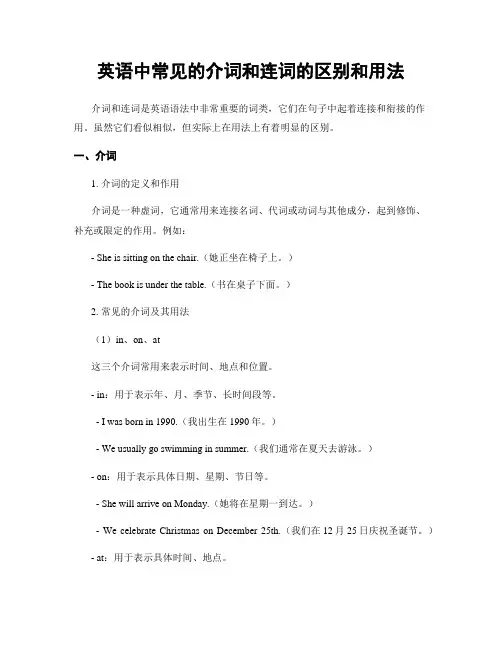
英语中常见的介词和连词的区别和用法介词和连词是英语语法中非常重要的词类,它们在句子中起着连接和衔接的作用。
虽然它们看似相似,但实际上在用法上有着明显的区别。
一、介词1. 介词的定义和作用介词是一种虚词,它通常用来连接名词、代词或动词与其他成分,起到修饰、补充或限定的作用。
例如:- She is sitting on the chair.(她正坐在椅子上。
)- The book is under the table.(书在桌子下面。
)2. 常见的介词及其用法(1)in、on、at这三个介词常用来表示时间、地点和位置。
- in:用于表示年、月、季节、长时间段等。
- I was born in 1990.(我出生在1990年。
)- We usually go swimming in summer.(我们通常在夏天去游泳。
)- on:用于表示具体日期、星期、节日等。
- She will arrive on Monday.(她将在星期一到达。
)- We celebrate Christmas on December 25th.(我们在12月25日庆祝圣诞节。
)- at:用于表示具体时间、地点。
- The meeting will start at 9 o'clock.(会议将在9点开始。
)- I met her at the library.(我在图书馆遇见了她。
)(2)with、without、by这三个介词常用来表示伴随、条件和方式。
- with:表示伴随、附带。
- She went to the party with her friends.(她和她的朋友们一起去了派对。
) - He always carries a book with him.(他总是随身带着一本书。
)- without:表示没有、不带。
- I can't live without you.(没有你我无法生活。
)- Please don't leave without saying goodbye.(请不要离开而不说再见。
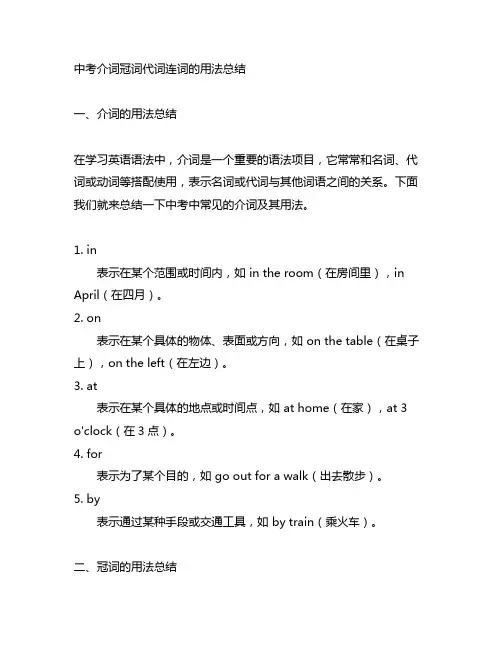
中考介词冠词代词连词的用法总结一、介词的用法总结在学习英语语法中,介词是一个重要的语法项目,它常常和名词、代词或动词等搭配使用,表示名词或代词与其他词语之间的关系。
下面我们就来总结一下中考中常见的介词及其用法。
1. in表示在某个范围或时间内,如 in the room(在房间里),in April(在四月)。
2. on表示在某个具体的物体、表面或方向,如 on the table(在桌子上),on the left(在左边)。
3. at表示在某个具体的地点或时间点,如 at home(在家),at 3 o'clock(在3点)。
4. for表示为了某个目的,如 go out for a walk(出去散步)。
5. by表示通过某种手段或交通工具,如 by train(乘火车)。
二、冠词的用法总结冠词是英语中一个比较难点的语法项目,分为定冠词“the”和不定冠词“a/an”。
下面我们来总结一下中考中常见的冠词用法。
1. 定冠词“the”表示特指,如 the sun(太阳)。
2. 不定冠词“a/an”表示泛指,如 a book(一本书)。
三、代词的用法总结代词是用来代替名词的词语,它能够减少重复,使语言更加简洁。
在中考中,代词也是一个重要的语法项目。
下面我们来总结一下中考中常见的代词及其用法。
1. 人称代词主格:I(我)、you(你)、he(他)、she(她)、it(它)、we(我们)、you(你们)、they(他们)。
宾格:me(我)、you(你)、him(他)、her(她)、it (它)、us(我们)、you(你们)、them(他们)。
形容词性:my/mine(我的)、your/yours(你的)、his(他的)、her/hers(她的)、its(它的)、our/ours(我们的)、your/yours(你们的)、their/theirs(他们的)。
2. 物主代词指代名词所有物,如 mine(我的)、yours(你的)、his(他的)、hers(她的)、its(它的)、ours(我们的)、yours(你们的)、theirs(他们的)。
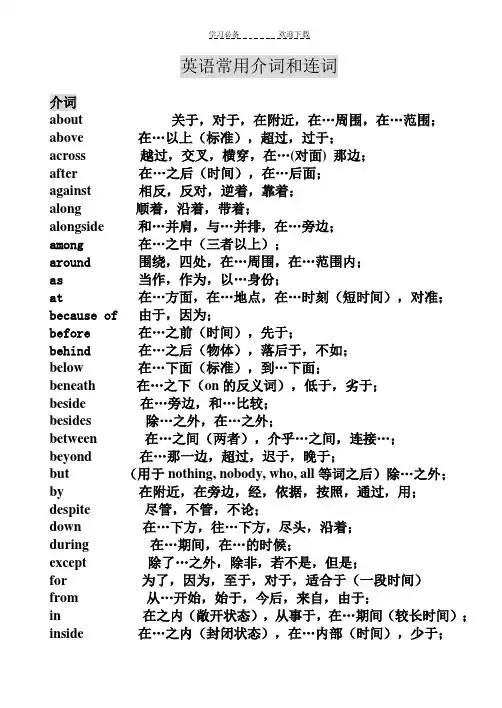
英语常用介词和连词介词about 关于,对于,在附近,在…周围,在…范围;above 在…以上(标准),超过,过于;across 越过,交叉,横穿,在…(对面) 那边;after 在…之后(时间),在…后面;against 相反,反对,逆着,靠着;along 顺着,沿着,带着;alongside 和…并肩,与…并排,在…旁边;among 在…之中(三者以上);around 围绕,四处,在…周围,在…范围内;as 当作,作为,以…身份;at 在…方面,在…地点,在…时刻(短时间),对准;because of 由于,因为;before 在…之前(时间),先于;behind 在…之后(物体),落后于,不如;below 在…下面(标准),到…下面;beneath 在…之下(on的反义词),低于,劣于;beside 在…旁边,和…比较;besides 除…之外,在…之外;between 在…之间(两者),介乎…之间,连接…;beyond 在…那一边,超过,迟于,晚于;but (用于nothing, nobody, who, all等词之后)除…之外;by 在附近,在旁边,经,依据,按照,通过,用;despite 尽管,不管,不论;down 在…下方,往…下方,尽头,沿着;during 在…期间,在…的时候;except 除了…之外,除非,若不是,但是;for 为了,因为,至于,对于,适合于(一段时间)from 从…开始,始于,今后,来自,由于;in 在之内(敞开状态),从事于,在…期间(较长时间);inside 在…之内(封闭状态),在…内部(时间),少于;into 到…里,进入到…之内,深入…之中;in spite of 尽管,不管,不论;like 象,如同;near 在…近旁,近似于;of …的,由…制成的,关于,对于,属于;off 从…离开,从…掉下,脱离;on 在…之上,依附于,在…时候,(特定的时间);opposite 在…对面;out of 从…出来,出于,…中间有…;outside 在…之外,向…之外;over 越过,在…正上方;past 过去(时间),超过,晚于,从…经过;regarding 关于,对于,就…而论;round 在周围,环绕,在…一带,在…附近;since 自从,自…以来,从…至今,既然,因为;through 穿过,通过,从头至尾,经由,凭借;throughout 遍及,贯穿,从头至尾;till 直到…为止,直到…(才),在…以前;to 向,往,给…,直到…为止,在…之前;toward 向,对于,为了,接近,将近;under 在…正下方,在…之内,低于,未满;until 到…为止,在…以前;up 向上,在上,沿;upon 在…之上,在…后立即;with 与…一起,和…,带着…,偕同,一致;within 在…之内(时间),在…范围,不越出;without 在…外面,没有,如果没有,要没有;连词并列连词and 和,那么,渐渐;or 或,否则,不管是…,还是;but 但是,而是,的确…但;nor 也不so 也是,因此,所以,那么,这样看来;for 因为(表示推测),由于;相关连词both A and B 既是A又是B;either A or B 不是A 就是B;neither A nor B 既不是A也不是B ,两者皆非;not only A but also B 不但A而且B;A as well asB 不但A而且B , 与,和;准连词而且besides, furthermore, moreover, in addition;然而yet, still, however, nevertheless;否则else, otherwise;因此所以thus, hence, therefore, accordingly, consequently;引导名词从句的连词从属连词that, whether, if;疑问连词what, which, who/whom/whose;疑问副词when, where, why, how;复合关系代词whatever, whoever, whomever;引导定语从句的连词关系代词who (whom whose), which, that, as;关系副词when, where, why;关系形容词which, whose…引导状语从句的连词表示时间when, while, as, till, whenever, since, as soon as…表示条件if, unless, as long as, in case, if only, on condition…表示结果s o…that , such…that (如此…以至于);表示目的that, so that, in order that; lest, for fear, in case;表示原因as, because, now (that ), seeing (that), since…表示让步whether…or, notwithstanding, though, for all that…表示地点where, wherever, everywhere, anywhere表示方式as, as…so, as if, according as;表示比较than, the more… the more…, as…as…, not so…as;。
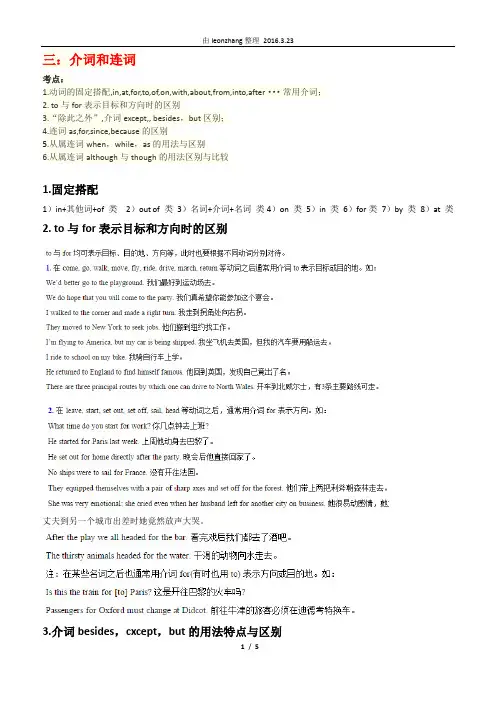
三:介词和连词考点:1.动词的固定搭配,in,at,for,to,of,on,with,about,from,into,after···常用介词;2.to与for表示目标和方向时的区别3.“除此之外”,介词except,, besides,but区别;4.连词as,for,since,because的区别5.从属连词when,while,as的用法与区别6.从属连词although与though的用法区别与比较1.固定搭配1)in+其他词+of类2)outof类3)名词+介词+名词类4)on类5)in类6)for类7)by类8)at类2. to与for表示目标和方向时的区别丈夫到另一个城市出差时她竟然放声大哭。
3.介词besides,cxcept,but的用法特点与区别1)原则区别三者都可表示“除外”,但besides表示一种累加关系,意指“除了什么之外,还有……”; except或but则表示一种排除关系,意指“除了什么之外,不再有……”。
如;2)后接动词做宾语三者均可后接动词作宾语,但except, but后接的动词通常用不定时形式,而besides后则通常接动名词形式。
如:注:but和except后接不定式作宾语时,该不定式有时带to,有时不带,原则:若其前有do,不定式不带to,反之亦然。
如:3)but与except两者都可表示“除…外不再有…”,但but侧重指意义的完整性,而except则侧重指后边除去的部分。
如:在现代英语中,but的介词用法十分有限,一般来说,它只能用在下列词语之后:no, no one, nobody, nothing, nowhere等;any, every等(同no);all, none等;who, what, where等。
一般来说,不出现上述词汇,通常不宜使用介词but(但是except却没有这样的限制)。
如:另外,but一定不能用于句首,except通常不用于句首。
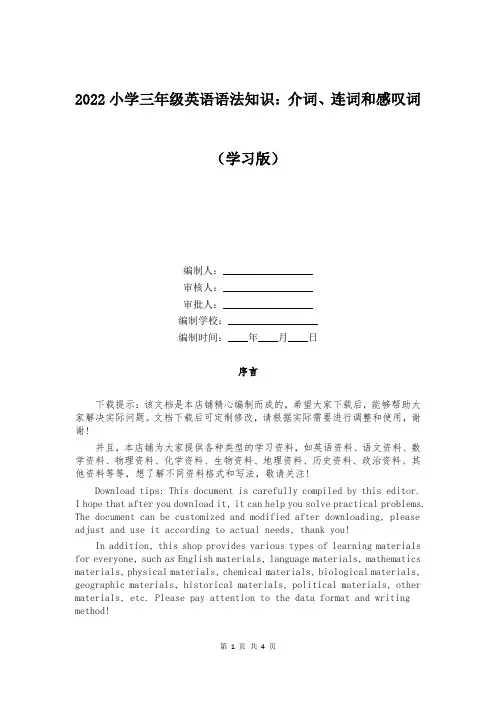
2022小学三年级英语语法知识:介词、连词和感叹词(学习版)编制人:__________________审核人:__________________审批人:__________________编制学校:__________________编制时间:____年____月____日序言下载提示:该文档是本店铺精心编制而成的,希望大家下载后,能够帮助大家解决实际问题。
文档下载后可定制修改,请根据实际需要进行调整和使用,谢谢!并且,本店铺为大家提供各种类型的学习资料,如英语资料、语文资料、数学资料、物理资料、化学资料、生物资料、地理资料、历史资料、政治资料、其他资料等等,想了解不同资料格式和写法,敬请关注!Download tips: This document is carefully compiled by this editor.I hope that after you download it, it can help you solve practical problems. The document can be customized and modified after downloading, please adjust and use it according to actual needs, thank you!In addition, this shop provides various types of learning materials for everyone, such as English materials, language materials, mathematics materials, physical materials, chemical materials, biological materials, geographic materials, historical materials, political materials, other materials, etc. Please pay attention to the data format and writing method!2022小学三年级英语语法知识:介词、连词和感叹词1.介词:介词是一种虚词,不能单独使用,必须在介词后面加上个名词或代词使用,作句子成份。
初中英语语法讲解-15个专题汇总(习题和答案)专题一名词1 专题二数词、冠词7 专题三介词、连词14 专题四代词21 专题五形容词、副词30 专题六动词的分类39 专题七情态动词、系动词46 专题八动词时态53 专题九被动语态59 专题十非谓语动词66 专题十一简单句、并列句76 专题十二祈使句、感叹句84 专题一三宾语从句90 专题一四定语从句98 专题一五状语从句105 专题一名词 1. 名词的数 1. 概述: 名词按其表示的事物的性质分为可数名词和不可数名词。
2. 可数名词及其单复数:可数名词有单复数变化,其前通常用不定冠词和数词来修饰,还可用many, few, a few, some, any, plenty of, lots of, a number of 等修饰。
构成名词复数形式的方法分为规则法和不规则法两种。
1)复数的规则构成法:绝大多数英语中的名词复数都是在单数名词后加上词尾-s或-es构成的。
具体规则如下图:规则例词一般情况下加-s apple-apples, ruler-rulers 以s, x, ch,sh,结尾的加-es bus-buses, box-boxes, watch-watches,1/ 136brush-brushes 以辅音字母加y结尾的,把y变成i再加-es city-cities, county-countries 以f或fe结尾的,把f或fe变成v,再加-es knife-knives, leaf-leaves 以o结尾的,有的词尾加-es,有的加-s 在初中英语范围内加-es的主要有以下4个:tomato-tomatoes,potato-potatoes Hero-heroes,Negro-Negroes 2) 复数的不规则构成法:a.单复同形的:Chinese-Chinese, Japanese-Japanese, deer-deer, sheep-sheep, fish-fish(表示鱼的数量) b. 熟记下列词的复数变化:man-men, woman-women, policeman-policemen, foot-feet, tooth-teeth, mouse-mice, child-children c. 以man, woman 做定语构成的复合名词,变复数时要全变:a man teacher-two men teachers; 其他情况一般只变主体名词而作定语的名词不变:a girl student-two girl students 3. 不可数名词:不可数名词没有单复数。
专题3 语法填空之介词距离高考还有一段时间,不少有经验的老师都会提醒考生,愈是临近高考,能否咬紧牙关、学会自我调节,态度是否主动积极,安排是否科学合理,能不能保持良好的心态、以饱满的情绪迎接挑战,其效果往往大不一样。
以下是本人从事10多年教学经验总结出的以下学习资料,希望可以帮助大家提高答题的正确率,希望对你有所帮助,有志者事竟成!养成良好的答题习惯,是决定高考英语成败的决定性因素之一。
做题前,要认真阅读题目要求、题干和选项,并对答案内容作出合理预测;答题时,切忌跟着感觉走,最好按照题目序号来做,不会的或存在疑问的,要做好标记,要善于发现,找到题目的题眼所在,规范答题,书写工整;答题完毕时,要认真检查,查漏补缺,纠正错误。
总之,在最后的复习阶段,学生们不要加大练习量。
在这个时候,学生要尽快找到适合自己的答题方式,最重要的是以平常心去面对考试。
英语最后的复习要树立信心,考试的时候遇到难题要想“别人也难”,遇到容易的则要想“细心审题”。
越到最后,考生越要回归基础,单词最好再梳理一遍,这样有利于提高阅读理解的效率。
另附高考复习方法和考前30天冲刺复习方法。
一.高考真题1.(2022新高考I卷)Giant pandas also serve __________ an umbrella species(物种), bringing protection to a host of plants and animals in the southwestern and northwestern parts of China.2.(2022全国甲卷)He flew 4, 700 kilometers __________ Xi’an to Kashgar on Sept. 20.3.(2022全国乙卷)May 21st this year marks the first International Tea Day, which was named officially __________ the United Nations on November 27th, 2019.4.(2021新课标II卷)A company representative wrote back and told me the airline was switching over_________ plastic to paper cups on all of its 1,200 daily flights.5.(2021全国甲卷)It was built (build) originally to protect the city __________ the Tang dynasty and has now been completely restored (修复).6.(2021全国乙卷)It was not widely accepted as a travel concept __________ the late 1980s.7.(2021全国乙卷)Due to the growing popularity of environmentally-related and adventure travel, various types __________ trips are now being classified as ecotourism.8.(2020新课标I卷)because it has a lot of deep craters (环形山),more so __________ the familiar near side.9.(2021年浙江卷)In 1844 they bought it _________ $1,200 and some land from Charles Dresser, who performed their marriage10.(2021浙江卷1月)The study found that between 1985 and 2017, average rural BMI increased____40____ 2. 1 in women and men.11.(2021年北京卷)While riding his bike home ________ a cold night,he came across a sad-looking elderly woman wandering the streets by herself.12.(2020新课标II卷)Oranges: Orange trees are more ___________ decoration; they are a symbol of good fortune and wealth.13.(2020新课标II卷)Bamboo plants are associated ___________ health, abundance and a happy home.14.(2020新课标III卷)The artist was finally humbled (谦卑) by the greatest artist _________ earth, Mother Nature.15.(2020年北京卷)Over time, the bags fall apart___ ___countless tiny pieces, and fish can accidentally eat some of them.16.(2020年浙江卷)Some time after 10,000 BC,people made the first real attempt to control the world they lived __________,through agriculture.17.(2020年浙江卷)Farming produced more food per person __________ hunting and gathering,so people were able to raise more children18.(2020浙江卷1月)This aging of the population is driven ________two factors.19.(2019新课标I卷)Modern methods _______ tracking polar bear populations have been employed only since the mid1980s.20.(2019新课标III卷)We were first greeted with the barking by a pack _________ dogs, seven to be exact.21.(2019年北京卷)First celebrated __________ 1970, the Day now includes events in more than 190 countries and regions(地区).22.(2019年浙江卷)But can uniforms help improve school standards? The answer __________ this question is not clear.23.(2018新课标I卷)While running regularly can’t make you live forever,the review says it is more effective at lengthening life ____________walking, cycling or swimming.24.(2018新课标II卷)Corn uses less water rice and creates less fertilizer (化肥) runoff.25.(2018新课标III卷)My name is Mireya Mayor. I was searching these three western lowland gorillas I'd been observing.26.(2018年浙江卷)If you are not going to suffer this problem, then I suggest that the next time you go to your mum’s home ________ dinner, get a few cooking tips from her.27.(2018·北京)—Good morning, Mr. Lee’s office.—Good morning. I’d like to make an appointment _________ next Wednesday afternoon.A. forB. onC. inD. at28. (2020年山东卷)Museums must compete ________people’s spare time and money with other amusements. Most museums also welcome school groups and arrange special activities for children.二.名校模拟真题(2022·全国·模拟预测)阅读下面短文,在空白处填入1个适当的单词或括号内单词的正确形式。
介词和连词中考命题趋势考纲解读(介词和连词在近5年考试中的考查点)1. 熟悉和掌握常用介词和连词的用法。
2. 了解和运用一些常见的介词短语及连词的使用方法。
3. 能正确区分并列连词和从属连词,并掌握其用法。
命题预测1. 介词的考查方式以单项选择的形式为主,也会在单词拼写、完形填空中进行考查。
2. 据统计,介词的常考点有:(1)表示时间的介词,如:2019·临沂,17题;2019·咸宁,30题。
(2)表示地点方位的常用介词,如:2019·大庆,2题。
(3)表示方式、手段或工具的介词,如:2019·云南,21题。
(4)介词的常见搭配,如:2019·徐州,7题。
连词的考点有:(1)并列连词的用法,如:2019·绥化,6题;2019·临沂,28题。
(2)从属连词的用法,如:2019·长春,13题;2019·乐山,30题。
3. 预计今后中考中介词考查的重点将是其基本用法(同时也要注意介词的常见搭配的情况);连词的考查将以并列连词和从属连词基本含义为重点,也要注意考查连词的特殊用法,比如:“就近原则”,不能出现在同一个句子中的连词等。
一、介词概述:介词又叫前置词,是一种虚词。
介词是一种用来表示词与词或者词与句之间的关系的词,在句中不能单独作句子成分。
介词一定要有宾语,充当宾语的一般有名词、代词或相当于名词的其他词、短语或句子。
如:I am in school. in the morningThanks for helping me. What about going for a walk?二、介词的句法功能:介词不能独立在句中作成分,介词后必须与名词、代词或动名词构成介词短语在句中充当一个成分,表示人、物、事件等与其他人、物、事件等之间的关系。
1. 作定语:The book on the table is mine.2. 作状语:We have breakfast at seven. (表时间);They were late for meeting because of the heavy rain. (表原因);They started the machine by pressing the button. (表方式)3. 作表语:My dictionary is in the bag.4. 作宾语补足语:I found him in the office.三、介词分类:①时间介词;②方位介词;③方式介词;④目的介词;⑤原因介词;⑥运动方向介词;⑦比较介词等等。
介词连词总结知识点高中一、介词的定义和用法1. 介词的定义介词是一类词性,用来连接名词、代词、动名词或相似的词,构成介词短语,起着修饰、限制、说明名词或代词的作用。
2. 介词的用法(1)表示时间、地点、方向等概念。
如:at, in, on, to, from, through, over等。
(2)表示方式、原因、目的等。
如:by, for, of, because of, with等。
(3)用在短语中,表示特定意义。
如:in front of, on top of, by means of等。
3. 介词短语介词短语是由介词+宾语构成的短语结构,它在句子中起修饰名词、代词等作用。
4. 介词的错误用法常见的介词错误包括介词的搭配错误、介词的遗漏和多余、介词放置位置错误等。
二、连词的定义和用法1. 连词的定义连词是一类词性,用来连接词、短语、句子或句子的成分,使之构成完整的句子结构。
2. 连词的分类(1)并列连词:表示并列关系,连接两个或多个相同成分。
如:and, or, but等。
(2)从属连词:用来引导从句,在句子中起连接主句和从句的作用。
如:when, because, although等。
3. 连词的用法(1)并列连词连接两个主语、宾语或谓语等成分,构成并列结构。
(2)从属连词引导从句,表示从属关系,起连接主句和从句的作用。
4. 连词的错误用法常见的连词错误包括并列连词的误用、从属连词的误用等。
三、介词和连词的练习1. 单词记忆和搭配练习通过记忆常见的介词和连词,掌握它们的用法和搭配。
2. 语境搭配练习通过阅读材料,学习介词和连词的用法,掌握它们在语境中正确的使用方式。
3. 句型转换练习通过对句子中的介词和连词进行转换,加深理解和记忆。
四、介词和连词的应用技巧1. 规律记忆掌握介词和连词的规律和常见搭配,以便运用到实际语境中。
2. 多读多写通过多读多写,积累正确使用介词和连词的经验,提高语言表达能力。
中考复习三介词和连词撰稿:赵吉存责编:郭素清介词考查要求:主要体现在单项选择和完形填空中,涉及的题目多,考查的范围广,主要考查介词的基本意义,意义相近的介词辨析、固定搭配等。
知识总结:1. 介词的概念介词是一种虚词,一般用在名词、代词等的前面,用来表示其后面的名词或者相当于名词的词或短语和其他句子成分的关系,在句子中不能单独作句子成分,需和它后面的词共同充当句子成分。
介词后面的名词或者相当于名词的词或短语叫介词宾语。
可以作介词宾语的词通常有:1)名词、代词或从句。
He lives near the school. 他居住在学校附近。
Our teacher was very angry with him. 我们的老师非常生他的气。
2)动名词。
They have a good idea for solving this problem. 他们有一个解决这个问题的好方法。
3)动词不定式(仅限于介词but,except)。
I want nothing except to sleep. 除了睡觉,我什么也不想做。
2. 介词的种类1)根据结构分类简单介词:即由一个词构成的单一介词。
例如:for,at,in,on,of,to等。
复合介词:即由两个词组合在一起的介词,也称合成介词。
例如:without inside outside into within短语介词:即由短语构成的介词。
例如:because of,according to,thanks to等。
2)根据意义分类表示地点的介词:at,behind,beside,around,near,on,by,in front of,across等。
表示时间的介词:about,at,after,before,by,during,in,over,past,since,until 等。
表示原因的介词:for,with,from等。
表示手段和方式的介词:by,in,with等。
表示“除去”的介词:but,except,besides等。
表示其他含义的介词:about (关于,大约), on (关于), without (没有), off (从……离开),instead of (代替), with (和)等。
3. 介词短语的功能介词和介词宾语一起构成介词短语。
介词短语可以在句子中作下列成分:1)作表语:She looks like an actress. 她看上去像演员。
What’s the book about? 这本书是讲什么的?2)作宾语补足语:A cold kept him in bed for a week. 感冒使他卧床一周。
I found my mother on the bus. 我发现我妈妈在公交车上。
3)作状语:I will wait for you until tomorrow. 我等你到明天。
The teacher came into the classroom with a smile on her face.那位老师面带笑容进了教室。
4)作定语:A friend in need is a friend indeed. 患难见真情。
4. 中考经常考查的几组介词的用法1) 时间介词at/ in/ on:表示具体的时间点(几点钟)和在周末前面用介词at。
I usually get up at six in the morning. 我通常在早上六点起床。
I wasn’t here at that time. 那时我没在这里。
注意:at dinner time 在(吃)晚饭时at night 在夜间at weekends / the weekend 在周末表示在特定的日子、某月某日、星期几、节日等时间的前面,或者某一天的早上、下午、晚上的前面用介词on。
We can play football on Sunday. 我们可以在星期天踢足球。
They came to my house on a cold winter morning. 他们在一个寒冷的早晨来到了我家。
表示较长的一段时间段的名词或短语前经常用in,如在早上、下午、晚上;在某月某年等。
I was born in May. 我出生在五月。
They came here in 1998. 他们在1998年来这里的。
What are you going to do in the winter holiday? 寒假你打算做什么?注意:表示上午、下午或晚上的名词前一般用介词in,但是具体到某一天的上午、下午或晚上用介词on。
in the morning 在上午on Monday morning 在星期一的上午2)时间介词for,sincefor 和since引导时间状语都有延续之意。
for +时间段表示“(延续).......之久”。
since +时间点表示从过去某时延续到现在的一段时间。
They have lived in China for ten years. 他们在北京住了十年了。
She has worked here since last year. 从去年起她就在这里工作。
3)时间介词in,afterin+时间段表示从现在算起一段时间以后,一般用于将来时;after+时间段表示从过去算起一段时间后,一般用于过去时。
另外after后也可以接具体时间用于将来时。
He’ll be back in three hours. 他三小时后回来。
He came back after three hours.三小时后,他回来了。
He’ll be back after 3 o’clock. 他三点后会回来。
4) 方位介词at,in,on,to表示在某一点的位置或者具体的位置用at。
We will have a picnic at the foot of mountain. 我们在山脚下举行野餐。
表示在某一个范围之内的方位用介词in。
Shandong lies in the east of China. 山东省在中国的东部。
(山东省在中国范围之内)表示在某一个范围之外的方位用介词to。
Japan lies to the east of China. 日本在中国的东部。
(日本在中国范围之外)表示两者相互接触,强调在同一条线或者同一个平面上用介词on。
Shandong lies on the north of Jiangsu. 山东省在江苏省的北部。
(两省接壤)5) 地点介词in/on / under/ above / over/ below表示一个物体在另一个物体的上面用介词on。
There is a book on the desk. 课桌上有一本书。
(书在课桌表面上)表示一个物体在另一个物体的里面用介词in。
There are some dumplings in the bowl. 碗里有一些水饺。
(水饺在碗里面)表示一个物体在另一个物体的下方(一般为正下方)用介词under。
There is a ball under the chair. 椅子下面有一个球。
(球在椅子的下面)below意思是“在……之下”,所指范围较宽,不一定在某物的正下方。
From the plane, we could see the whole town below us.从飞机上我们可以看到下面城镇的全貌。
表示一个物体在另一个物体的上方,并非由“垂直之上”的含义,用介词above, 其反义词为below。
His room is above ours. 他的房间在我们的上面。
表示一个物体在另一个物体的正上方用介词over,有时有“覆盖;越过”之意。
His room is over ours. 他的房间就是我们头上的那间。
There is a big bridge over the river. 河上有一座大桥。
(桥在河的上面)6) 方位介词between,amongbetween是表示在两者之间;among表示在三者或者三者以上之间。
It’s a secret between you and I. 这是我和你之间的秘密。
There is a village among the trees.在树林里面有一个小村庄。
7) 表示工具、手段、材料的in,by,within可以和表示某种语言的名词连用表示“用某种语言”。
Can you answer my question in English?你能用英语回答我的问题吗?in也可以表示用某种工具或者材料的意思。
Don’t write in pencil. Please write in ink. 不要用铅笔写,请用钢笔写。
by指使用的方法和手段,by和表示交通工具的名词连用时,中间不用冠词。
My father often goes to work by bus. 我爸爸经常乘坐公共汽车去上班。
He made a living by selling newspapers. 他靠卖报为生。
with表示“借助于某种具体的工具或身体部位”。
例如:We write with our hands. 我们用手写字。
I cut the cake with a knife. 我用刀子切开了蛋糕。
8) 方位介词across,through,past表示从某一个物体的表面横过、穿过用介词across。
They swam across the river. 他们游过了河。
从某一个物体的里面或者一定范围内穿过、横过用介词through。
The boys go through the forest quickly. 这些男孩子快速地穿过树林。
从旁边经过用past。
They drove past a big supermarket. 他们开车经过一家大超市。
9)except,besidesexcept表示“除……之外(其他的都)”其后的宾语是被排除在整体之外的。
besides表示“除……之外(其他的也)”,其后的宾语是被包括在整体之内的。
All the students took part in the sports meeting except Tom.除了汤姆以外,其他的同学都参加了运动会。
(汤姆没有参加)We need three more boys besides Tom.除了汤姆以外,我们还需要三个男同学。
(我们也需要汤姆)易错点点拨:介词容易出错的地方在于上述一些介词的用法的混淆及在一些固定搭配中的误用。
1) I usually play football with my friends in Sunday afternoon.〔解析〕本题是考查介词的用法,表示在早上、下午、晚上用介词in,但表示在具体的某一天的早上、下午、晚上用介词on。